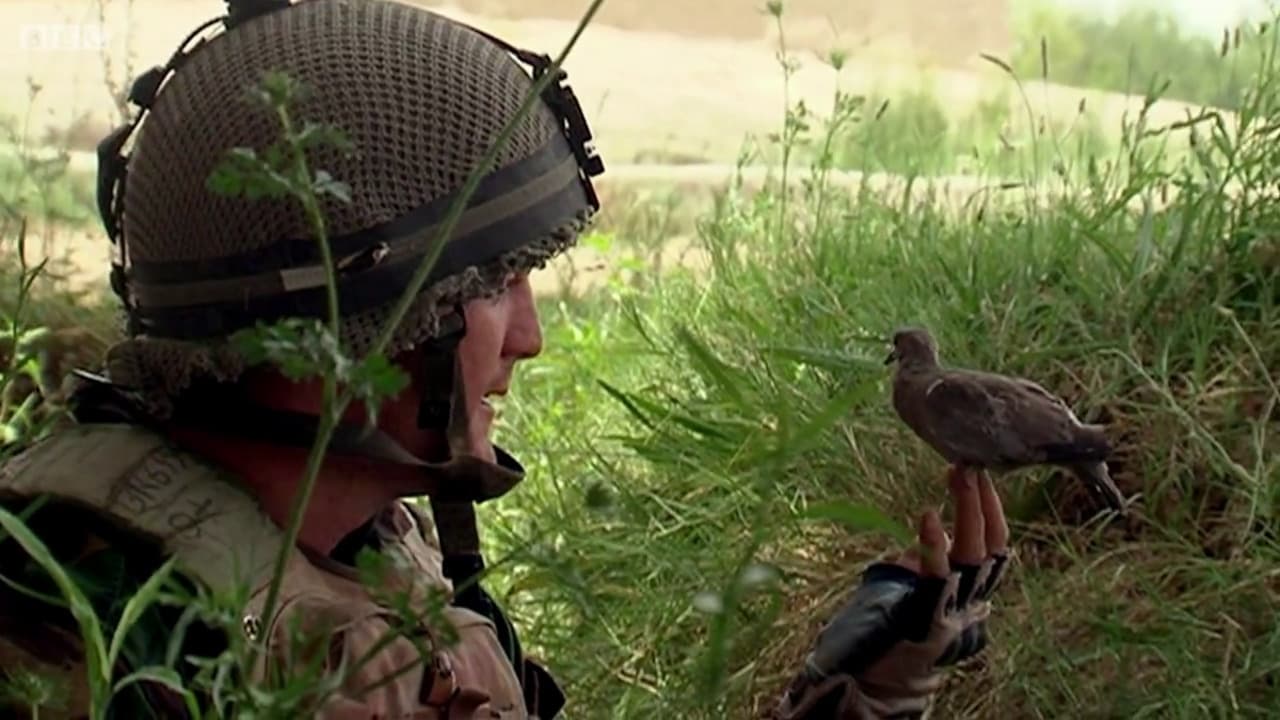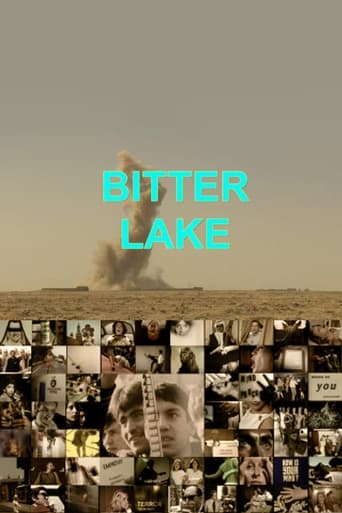



Truly Dreadful Film
I gave this film a 9 out of 10, because it was exactly what I expected it to be.
View MoreI didn’t really have many expectations going into the movie (good or bad), but I actually really enjoyed it. I really liked the characters and the banter between them.
View MoreEasily the biggest piece of Right wing non sense propaganda I ever saw.
View MoreI like Adam Curtis - he is a strong force for good in this world and he usually offers a much needed balance to the usual party and partisan line. He makes the kind of films that Michael Moore would surely like to make if he didn't need the money so much. Bitter Lake attempts to explain the complex situation in Afghanistan and the history behind the UK and US failed military objectives and recent withdrawals. It is a long film and it is not told in a linear fashion. It's a sonic and visual roller coaster ride - so you had better commit time to it. Don't watch it if you are tired or seeking some benign background amusement. A few people have mentioned about the scene with the soldier and the bird. I think that they perhaps missed the irony and the juxtaposition of it. There were many other scenes that were there doing the same job. Bitter Lake is an important film because it enlightened me as to how the British Army, The Red Army and the US Army and many other Western Powers and Organisations have failed in all of their efforts to tame this wild and archaic land with their hardy, courageous, stubborn and proud people.
View MoreThis film marks a new era in online content from both one of the worlds great broadcasters and filmmakers. Rather than be constrained by the formats of television and convention of breaking things up into mini-series (Curtis has already made several of such landmarks), Adam Curtis has been given the freedom to make a lengthy, challenging feature documentary that has gone straight to BBC iplayer.The result is a departure from his usual heavily-narrated work to a much more impressionistic piece of cinema that uses the metaphor of SOLARIS for the incomprehensible Afghanistan and related middle east conflicts. Raw footage is able to speak for itself. Typically cutting-room-floor material, such as shaky re-framing between shots is used to express something of complexity, like reading between the lines. The BBC's job is to be relevant and provide what the market is unable to do. Here, the BBC triumphs, Curtis having the shackles taken off has delivered a giant canvas of grey with various drip patterns, which is the perpetual mess of foreign intervention in Afghanistan and western policy in the middle east. The closer you get, the more complicated it is.Labor, Conservatives, Democrats and Republicans all get a hiding in the cyclical mess, which is examined via the extensive BBC archives to Which Curtis was given full access to. Some highlights include:Art teachers sent from England to the Afghan war effort to educate Afghanis about Marcel Duchamp and the early Avant-Garde. British "supermarket" for high-tech weaponry, set out like a luxury department store of big-toys whose customers are wealthy Gulf states. In Thatcher-era Britain, this was one of the most thriving industries. Highly recommended. This marks a new era because instead of bite-sized webisodes, this is a very serious piece of long-form filmmaking being made exclusively for what must become the main platform for public broadcasters world wide (online content). Though counterintuitive to what we perceive online content to be like, work like this is vital both in-itself but for breaking new ground and showing us what is possible with the relatively new platform/medium. Mike Retter
View MoreBitter Lake is a complex, intriguing yet at times confused history of UK and US interference in Afghanistan over the past several decades.The basic premise is that Western errors in the Middle East stem largely from an early accord struck by FDR with Saudi Arabia at the eponymous Bitter Lake on the Suez Canal, just after World War II. This support of Saudi Arabia, Curtis contends, indirectly led to the promotion of fundamentalist factions that have subsequently generated much of the violence in the Middle East, culminating in the ISIS movement today.It's an interesting point of view, and Curtis supports it with plenty of detail. The pay off comes when he uses this perspective to explain more recent events. For example, he shows why the 9/11 attackers, as well as Osama Bin Laden, all had a Saudi background. It's a connection that's been largely forgotten in Western media, and which I had never seen properly explained.Curtis succeeds even better at depicting the endless conflicts in Afghanistan as they must appear from the Afghan point of view. He argues convincingly that Western troops have been fighting a shadow war, engaging in the wrong battles, with the wrong foes, based on misguided objectives and a total lack of understanding of the fractured Afghan social structure. "There is something else out there, but we just don't have the apparatus to see it," says Curtis.Less effective is Curtis' tendency to frame all this in terms of good intentions that have almost certainly never existed at the highest levels of US or UK power. It may be that the troops and functionaries sent in to Afghanistan believed they were "creating democracy," but it's highly implausible that the White House or the Pentagon - or Downing Street - ever believed anything so naive and altruistic.The film is also weakened structurally by its needlessly slow pace, and by the inclusion of long stretches of video footage with no narration, which add little to our understanding. It's often not clear exactly what we're watching. Some segments - such as several minutes of a soldier playing with a tame bird - serve no purpose whatsoever, and should have been left on the cutting room floor.Nonetheless, Bitter Lake is well worth seeing, for the alternative, worm's-eye view it gives us of the endless conflict in Afghanistan. It's as if the film had been made by Afghans, to help us understand the unwarranted and wantonly destructive interventions that have been conducted by our governments in this distant and very alien country.
View MoreBitter Lake by Adam Curtis Good Intentions Adam Curtis is a good film maker. He knows how to edit and use music to great affect but it is the message in his films that are extremely troubling.The message taken from Bitter Lake (2015) is very simple.The West had nothing but good intentions with their disastrous invasion of Afghanistan. The sole reason was to spread democracy. Politicians have simply lost their way and in doing so, lost the confidence of their people. What is needed is a new story to believe in.Really? Is that it? One interview with a British Captain towards the end of the film says more about the illegal invasion of Afghanistan then the two and a quarter hours that precede it. He says, quite matter-of-factly, "Opium, that is largely what the conflict is about."Opium "Opium is a source of literally billions of dollars to extremist and criminal groups... Cutting down the opium supply is central to establishing a secure and stable democracy, as well as winning the global war on terrorism," (Statement of Assistant Secretary of State Robert Charles. Congressional Hearing, 1 April 2004) The United Nations Office on Drugs and Crime acknowledged, the Taliban prohibition of opium cultivation caused "the beginning of a heroin shortage in Europe by the end of 2001″.Immediately following the October 2001 invasion, opium markets were restored. Opium prices increased and by early 2002, the opium price (in dollars/kg) was almost 10 times higher than in 2000.According to the United Nations Office on Drugs and Crime's 2014 Afghan Opium Survey, 2014 was a bumper year for the Afghan opium cultivation as it has once again hit a record high.So how is Afghanistan's Multibillion Dollar Heroin Trade facilitated?Soviet InvasionZbigniew Brzezinski admitted CIA intervention in Afghanistan preceded the 1979 Soviet invasion.Question: The former director of the CIA, Robert Gates, stated in his memoirs ("From the Shadows"), that American intelligence services began to aid the Mujahadeen in Afghanistan 6 months before the Soviet intervention. In this period you were the national security adviser to President Carter. You therefore played a role in this affair. Is that correct? Brzezinski: Yes. According to the official version of history, CIA aid to the Mujahadeen began during 1980, that is to say, after the Soviet army invaded Afghanistan, 24 Dec 1979. But the reality, secretly guarded until now, is completely otherwise Indeed, it was July 3, 1979 that President Carter signed the first directive for secret aid to the opponents of the pro-Soviet regime in Kabul. And that very day, I wrote a note to the president in which I explained to him that in my opinion this aid was going to induce a Soviet military intervention.Q: Despite this risk, you were an advocate of this covert action. But perhaps you yourself desired this Soviet entry into war and looked to provoke it? B: It isn't quite that. We didn't push the Russians to intervene, but we knowingly increased the probability that they would.Q: When the Soviets justified their intervention by asserting that they intended to fight against a secret involvement of the United States in Afghanistan, people didn't believe them. However, there was a basis of truth. You don't regret anything today? B: Regret what? That secret operation was an excellent idea. It had the effect of drawing the Russians into the Afghan trap and you want me to regret it? The day that the Soviets officially crossed the border, I wrote to President Carter. We now have the opportunity of giving to the USSR its Vietnam war. Indeed, for almost 10 years, Moscow had to carry on a war unsupportable by the government, a conflict that brought about the demoralisation and finally the breakup of the Soviet empire.Q: And neither do you regret having supported the Islamic fundamentalism, having given arms and advice to future terrorists? B: What is most important to the history of the world? The Taliban or the collapse of the Soviet empire? Some stirred-up Moslems or the liberation of Central Europe and the end of the cold war? Le Nouvel Observateur, Paris, 15-21 January 1998 September 11th 2001 Surely after the far superior The Power of Nightmares: The Rise of the Politics of Fear (2004), a few questions should have arisen concerning the culpability of the horrific events of September 11th 2001? Rex Tomb of the FBI's public affairs unit states, "The reason why 9/11 is not mentioned on Osama bin Laden's Most Wanted page is because the FBI has no hard evidence connecting bin Laden to 9/11." Milli Gazette, 6/11/2006In the final statement of the film, Adam Curtis limply states "What is needed is a new story and one we can believe in!" A new story? Is that all?How about these words - "What is needed is truth and people we can believe in!" Adam Curtis is apologist for the mainstream orthodox view. He asks few questions about the deeper reasoning behind these seemingly perpetual wars. He simply makes statements that exonerate criminals for their obvious crimes.
View More